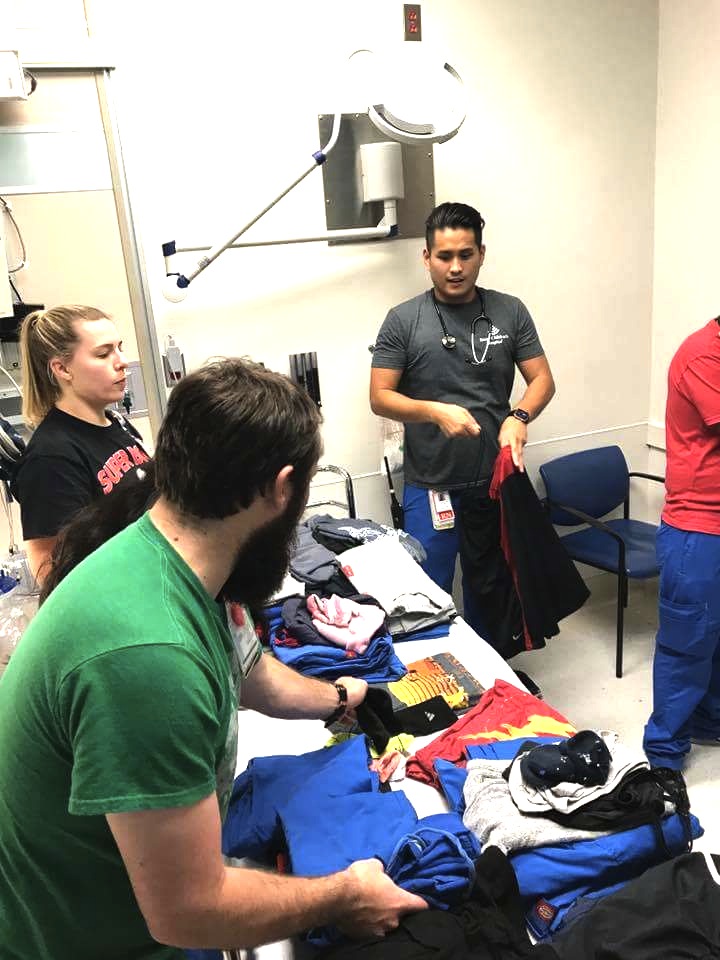Filipino nurses stay at posts as Harvey batters, floods Houston

As Hurricane Harvey approached, nurse Vi Dioneda knew she would to stay for days at her ICU unit at Texas Children’s Hospital in Houston. CONTRIBUTED
SPRING, Texas —As Hurricane Harvey approached Texas, last Friday, August 25, Vi Dioneda asked her husband to drive her to work early in the afternoon. The rain had already started pouring, she recalls, but the roads were completely clear.
If a disaster were to be declared that night, the 46-year-old Filipina nurse had a feeling that she would be staying for a longer time at the cardiovascular intensive unit of Texas Children’s Hospital, in Houston.
Days earlier, the hospital sent out warnings and disaster preparedness guidelines to staff. But like many Texans who are used to experiencing heavy rains, especially this time of the year, Dioneda thought the storm would soon pass.
She packed some dry food and clothes for three days. She could easily drive back home, she reminded herself, if she had to.
“I got into the Medical Center around 4:30 pm,” she says. “I joked, ‘this feels like going on a camp.’ While every department was fully staffed—from the top executives down to the workers at the cafeteria— everything seemed normal.”
But the next morning, Saturday, when she went out of the hospital to quickly check on the weather condition, it was a devastating scene: the slashing rain whipped through the trees, the medical complex was flooded, and many cars floated in the water.
“Five blocks away from us,” she said, “everything was [four feet] underwater.” She also learned that the nearby Ben Taub Hospital was evacuated due to flooding.
Streets turned into rivers
At that time Dioneda realized it was nearly impossible to leave the area, as Houston streets turned into rivers. Boats, rafts and canoes from volunteers and rescuers were the only means of transportation.

Nurse Miguel Cruz, standing, remained on duty as the hurricane wreaked havoc on his city. CONTRIBUTED
Then, despite the growing work demand in the hospital, she thought of her family— her husband, Gerald, their eight-year-old daughter, and her parents— that she had left at home, in Spring, Texas, about 35-minute drive from the Medical Center.
A man-made creek near their house, Gerald told her on the phone, had begun over- spilling. And the rain had also not stopped.
“I knew that my family was going to be OK. Our house is on an elevated ground,” she says, adding that they have lived there for a decade. “But by Sunday, I saw on television at the hospital that St. Ignatius Loyola Catholic Church—the church that we go to—was already flooded.”
Some of her coworkers, Dioneda says, had to brave the storm and took the risk of going home. They asked some rescuers on the streets deluged with floodwaters to take them back to their families.
In another hospital, where one of her Filipino friends works, Dioneda heard that workers were allowed to go home. But most of these workers, she adds, did not return to the hospital.
With only three hours of sleep on a cot each day, Dioneda stayed at Texas Children’s Hospital until Tuesday night, August 29.
Record-breaking rainfall
Hurricane Harvey, which brought record-breaking rainfall and treacherous floods, finally left Texas on Thursday with 38 people dead, hundreds injured and thousands of families homeless, according to officials.
Federal Emergency Management Agency (FEMA) officials said that 230 shelters are now operating across the state. The agency has already supplied five million meals to people who sought refuge from the storm.
“It was an experience that I will never forget,” says Carlos Miguel Cruz, a 26-year-old Filipino nurse. “Two years ago, on Memorial Day, I remember we had a major flooding in the area, but it was not as bad as this one. I have never seen this much rain before.”
Cruz, who works in the emergency unit at the same hospital with Dioneda, says that he didn’t think the storm would wreak havoc. “I should not have taken every warning for granted,” he says. “I did prepare, but I should have prepared more.”

Nurse Vi Dioneda, second from right front row, stayed in her hospital as Hurricane Harvey battered Houston, Texas. CONTRIBUTED
As Hurricane Harvey barreled into Texas, Cruz was also needed to be away from his own family—his mom and two sisters who live about 40 minutes from his townhouse in downtown Houston—to take care of patients in the hospital.
“They [his mom and siblings] live by the creek,” he says. “The creek over-spilled, but I am glad the floodwaters did not reach their house.”
And when Cruz went to the hospital for duty on the night the storm made landfall, his two roommates decided to stay in their townhouse and hunkered down. His third roommate had left the state before the storm hit.
Their place was spared from flooding, he says, but their surrounding area was submerged. For four days, his two roommates were trapped in the house.
As he drove back home from the hospital on Wednesday morning, he saw the floodwaters on the streets had started to recede. The sun, he noticed, was shining brightly over Houston’s skyline.
Cruz knows the city will recover.
Click here for more weather related news."

